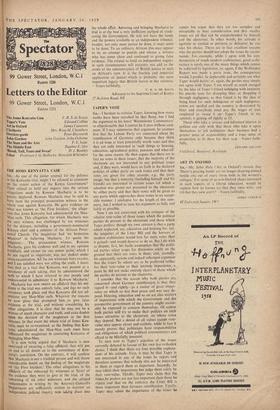TAPER'S VOTE
SIR,-11 hesitate to criticise Taper, knowing how many moths have been scorched by that flame, but I find the argument in his latest 'Westminster Commentary' so objectionable that I cannot let it pass without com- ment. If I may summarise that argument, he assumes first that the Labour Party are concerned about the reunification of Germany only because they think it is an issue at least potentially worth votes and that they are only interested in 'such things as housing, education, agricultural policy, pensions and what-all' for the same reason. He then argues that there are in fact no votes in these issues; that the majority of the electorate are not interested in any political issues and, if they were, would have no faith in the declared policies of either party on such issues and that their votes are given for other reasons, e.g.. the party image; but that a minority (including himself and his friends) are interested in certain issues (of which a selection was given) not presented to the electorate by either party and that their votes will be given to any party which approaches these issues in an accept- able manner. 1 apologise for the length of this sum- mary, but I wished to state his argument as fully and fairly as possible. Now I am not concerned with his estimate of the relative vote-value of those issues which the political parties do present to the electorate and those which Taper prefers; though my own opinion is that a party which neglected, say, education and housing for, say. the iniquities of the Litter Bill and the horrors of modern architecture would lose far more votes than it gained-- and would deserve to do so. But I do wish to dispute. first, his facile assumption that the politi- cal parties select issues for discussion solely on the ground that there are votes in them; and, secondly. his apparently serious and indeed vehement argument that the issues he selects are to he preferred (either for their vote-value or their intrinsic importance, a point he did not make entirely clear) to those which the parties do present to the electorate.
1 consider that the reason why both parties are concerned about German reunification is that they regard it--and rightly is a matter of great impor- tance on which no less than peace and war may de- pend. Housing, education and so on arc also matters of importance with which the Government and the prospective government of the country might reason, ably be expected to concern themselves. Of course both parties will try to make their policies on such issues attractive to the electorate, on whose votes they depend. But a denial of all values except vote- value may appear clever and realistic, while in fact it merely proves that politicians have responsibilities and obligations of which political commentators can afford to be blissfully innocent.
To turn now to Taper's rejection of the issues currently debated in favour of his own less orthodox choice. I think that there are four possible explana- tions of his attitude. First, it may be that Taper is not interested in any of the issues he rejects and therefore assumes that nobody else can be interested in them or regard them as important. Secondly. he may admit their importance but judge them solely by their vote-value. Thirdly. Taper may claim that the issues he prefers are not less important than those he rejects and that on the contrary the Litter Bill is more important than German reunification. Finally. Taper may admit the importance of the issues he rejects but argue that they are too complex and intractable to bear consideration and that smaller issues are all that can be comprehended by himself and the electorate. In other words, his attitude is egotistic or cynical or perverse or defeatist; he can take his choice. There are in fact excellent reasons why the parties should not adopt the issues he recom- mends. For example, while I agree with his con- demnation of much modern architecture, good archi- tecture is surely one of the many things which cannot be achieved by legislation; or. again, if the Wolfenden Report was made a party issue, the consequences would, I predict, be deplorable and certainly not what Taper would desire; or, again, the parties may simply not agree with Taper. I am myself as much enraged by the idea of Taper's friend indulging with impunity his puerile taste for dropping litter or dropping it through negligence, as that friend is by the idea of being lined for such indulgence or such negligence; towns are spoiled and the country is desecrated by litter and everybody must pay the wages of men employed. to sweep it up---Taper's friend, in my opinion, is getting off lightly at £5.
Those who take a serious and informed interest in politics can only wish that those who take it upon themselves to tell politicians their business had a greater sense of responsibility and a truer sense of proportion to lit them for their task.-- -Yours faith- fully,
EDWARD COLLINS










































 Previous page
Previous page